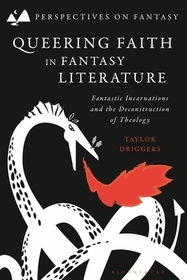
Queering Faith in Fantasy Literature
Fantastic Incarnations and the Deconstruction of Theology
Series: Perspectives on Fantasy;
- Publisher's listprice GBP 28.99
-
13 849 Ft (13 190 Ft + 5% VAT)
The price is estimated because at the time of ordering we do not know what conversion rates will apply to HUF / product currency when the book arrives. In case HUF is weaker, the price increases slightly, in case HUF is stronger, the price goes lower slightly.
- Discount 10% (cc. 1 385 Ft off)
- Discounted price 12 465 Ft (11 871 Ft + 5% VAT)
Subcribe now and take benefit of a favourable price.
Subscribe
13 849 Ft

Availability
printed on demand
Why don't you give exact delivery time?
Delivery time is estimated on our previous experiences. We give estimations only, because we order from outside Hungary, and the delivery time mainly depends on how quickly the publisher supplies the book. Faster or slower deliveries both happen, but we do our best to supply as quickly as possible.
Product details:
- Publisher Bloomsbury Academic
- Date of Publication 24 August 2023
- Number of Volumes Paperback
- ISBN 9781350231771
- Binding Paperback
- No. of pages248 pages
- Size 232x154x16 mm
- Weight 382 g
- Language English 490
Categories
Long description:
Fantasy literature inhabits the realms of the orthodox and heterodox, the divine and demonic simultaneously, making it uniquely positioned to imaginatively re-envision Christian theology from a position of difference. Having an affinity for the monstrous and the 'other', and a preoccupation with desires and forms of embodiment that subvert dominant understandings of reality, fantasy texts hold hitherto unexplored potential for articulating queer and feminist religious perspectives.
Focusing primarily on fantastic literature of the mid- to late twentieth century, this book examines how Christian theology in the genre is dismantled, re-imagined and transformed from the margins of gender and sexuality. Aligning fantasy with Derrida's theories of deconstruction, Taylor Driggers explores how the genre can re-figure God as the 'other' excluded and erased from theology. Through careful readings of C.S. Lewis's Till We Have Faces, Angela Carter's The Passion of New Eve, and Ursula K. Le Guin's The Left Hand of Darkness and the Earthsea novels, Driggers contends that fantasy can challenge cis-normative, heterosexual, and patriarchal theology. Also engaging with the theories of Hélène Cixous, Luce Irigaray, Marcella Althaus-Reid, and Linn Marie Tonstad, this book demonstrates that whilst fantasy cannot save Christianity from itself, nor rehabilitate it for marginalised subjects, it confronts theology with its silenced others in a way that bypasses institutional debates on inclusion and leadership, asking how theology might be imagined otherwise.
Table of Contents:
Series Editor Preface
Acknowledgements
Introduction: Worlds of Difference
Structure and methodology
Against apologetics
Deconstruction, theology, and feminism
Fantasy: definitions, critical approaches, and figurations
Chapter One: Saving Face?: Fantasy, Ethical Alterity, and Deconstruction
Defining deconstruction, deconstructing definitions
Vive la différance
Theological deconstruction
Deconstructive theology
The call to advent-ure; or, Derrida among the dragons
Deconstructing Christianity in The Passion of New Eve
'Holy places are dark places': facing the other in Till We Have Faces
Breaking the circle: religion without religion in The Left Hand of Darkness
Conclusions
Chapter Two: Dragons in the Neighbourhood: The Fantastic Discourse of Femininity
'A world all her own': Hélène Cixous and écriture feminine
Is fantasy feminine?
The laugh of the dragon
Mère Christianity: women's language and holy wisdom in Till We Have Faces
'The fecund darkness': 'bisexual' religion and society in The Left Hand of Darkness
Conclusions
Chapter Three: Hetero-doxies: Fantasy and the Problem of Divine Womanhood
Riddles in the dark: Luce Irigaray's feminist mysticism
Becoming Psyche: identity and Eros in Till We Have Faces
'Her own mythological artefact': The Passion of New Eve and the theatre of divine womanhood
Conclusions
Chapter Four: Drag(on) Theology: The Queer Strangers of Fantasy
Queer(ing) definitions
Queering theology
Undressing orthodoxy: Althaus-Reid's Indecent Theology
Theology of failure: Tonstad's queer messianism
Drag(on) theology: queer incarnations and fantastic embodiment
Double drag: sacred parody in The Passion of New Eve
Queer failure in/as worldbuilding: mystical perversions in The Left Hand of Darkness
Walking the Dragons' Way: sacred multiplicity in Earthsea
Conclusions
Monstrous Messianisms: Conclusions
Divine speech and matter: Ann Leckie's The Raven Tower
Swimming against the tides: Neon Yang's Tensorate series
Gods and seduction: N.K. Jemisin's Inheritance trilogy
Awaiting eucatastrophe
Notes
Bibliography
Index




